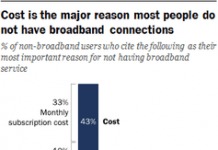 This article from GoodeReader, via today’s Morning Links, highlights an important advantage to the walled garden approach: stability. The issue is that with the reliance on other products, company’s services can be eliminated or changed at the whim of product changes beyond your control. In this case, Adobe will be changing the way they handle DRM, and any device vendor who does not issue a firmware update once the change rolls out will leave their customers with crippled devices that can’t read Adobe-encrypted books. Given that Amazon is the only major vendor that doesn’t sell encrypted epub, that is potentially a problem.
This article from GoodeReader, via today’s Morning Links, highlights an important advantage to the walled garden approach: stability. The issue is that with the reliance on other products, company’s services can be eliminated or changed at the whim of product changes beyond your control. In this case, Adobe will be changing the way they handle DRM, and any device vendor who does not issue a firmware update once the change rolls out will leave their customers with crippled devices that can’t read Adobe-encrypted books. Given that Amazon is the only major vendor that doesn’t sell encrypted epub, that is potentially a problem.
So, why wouldn’t a company simply issue a firmware update, you might be asking? Well, perhaps the company is out of business and can’t do it. Readers who are meanwhile still enjoying their perfectly serviceable devices may find themselves left in the lurch. Or perhaps customers are still enjoying an older model. Kobo will almost certainly provide an update for my Glo, but my mother is still using a first-gen Kobo. The company might not care to do the work to update a device that old—or the device itself might not be powerful enough to handle the new features.
I guess that is the safety in the walled garden approach. If Amazon doesn’t want to do the work to update their devices, they don’t have to. They can continue on their merry way with the present scheme and all their customer’s devices will work just perfectly. Or they can roll out a product change when they wish to, without the time constraint of meeting somebody else’s deadline. Sure, they may find a few users of older devices who would not be able to use the new features. But they also likely have their own data on how many people that would affect, so they have the option to offer those people an upgrade deal to get them onto a newer device, or to simply wait to make the changes until fewer of these older models are in circulation. It’s all up to them. They are at nobody else’s mercy.
I myself do not often purchase DRM-hobbled books these days, but I do read library books so I am somewhat concerned at this news. I hope Kobo will make the necessary updates. If they don’t, that may be what sends me back to Kindle devices again…

































You didn’t mention what I found most troubling about the GoodeReader article. “They also hope to unveil a new “always online” form of DRM within the next two years. This will function the same way most games work, that require you to always maintain an internet connection to verify the authenticity of the book.”
While I do spend much of my time connected, I also spend a fair amount of time not connected. If I can only read while on WiFi, I’m going to be extremely unhappy. And I don’t know yet how this would impact subscription services like Oyster and Scribd. A big part of their appeal is my ability to continue reading offline. I’d have to make some serious choices if that changed.
Juli, she didn’t mention it becasue it is nonsense. It simply won’t work. Hell, current implementations of always on DRM doesn’t even work _now_ with video games, and PCs are much more likely to have an internet connection. So there’s no way that an ebook reader could pull it off.
You really can’t rely on any unsubstantiated report that blog publishes. Remember, that site was banned from MobileRead for piracy and lying to the staff about piracy:
http://www.mobileread.com/forums/showthread.php?t=85235
And then about 5 months later that site’s sockpuppet was banned from MobileRead:
http://www.mobileread.com/forums/showthread.php?p=1694983#post1694983
@Nate, fair enough about the source. However, Adobe is implementing it in other areas (like their Creative Cloud solution). Granted, that DRM was cracked in 24 hours, so if Adobe tries it on ebooks, it may work about as well. Then there’s Adobe Primetime, which is implementing the same idea on video content. I don’t think it’s completely crazy to believe they would try it with ebooks. It comes under the “completely stupid and short sighted enough to be plausible” category.
But believe me. I want you to be right.
In some cases, the OEM that actually built the product might not even be in business any longer. When I did phone support for Best Buy’s store brand products, I had to tell people who bought early Insignia Blu-ray players that they were never going to get a firmware update that would let them watch the newest movies. I wasn’t supposed to tell them the reason, but it was that the OEM that built them for Insignia is no longer in business and hence couldn’t crank out any more updates.
(We were subsequently able to offer them $50 gift cards to make up for it if we could dig up their receipt and it had been bought less than 4 years ago.)
Don’t spin this as an Amazon only benefit. Other major vendors use their own DRM and as long as they’re around, it’ll be supported. Unmentioned Apple is at least as safe as Amazon.
If anything, Apple is a safer bet. My Kindle 3 hasn’t gotten any upgrades since I got it. It’s stuck in technological purgatory. But my iPad 3, bought about the same time, gets regular updates to iOS and iBooks.
Still better is to get ebooks that are keepers from unencrypted sources such as Smashwords.
@ Michael
By no updates do you mean KF8 support, Whispersync for audio integration, and other features?
@ Juli
You have a point there. It does fall under that category, and after today’s news it is not as stupidly implausible as I would like to think.
@Nate, oh, God. What news did I miss? I’ve been in client meetings most of the day, and I’m not as caught up as I obviously should be.
Sorry, I was talking about Adobe having ereader owners grab their ankles, not anything new new. I should have written yesterday’s news, sorry.
And that was bad enough that it makes the always-on DRM plausible.
@Nate. Whew! You had me worried.